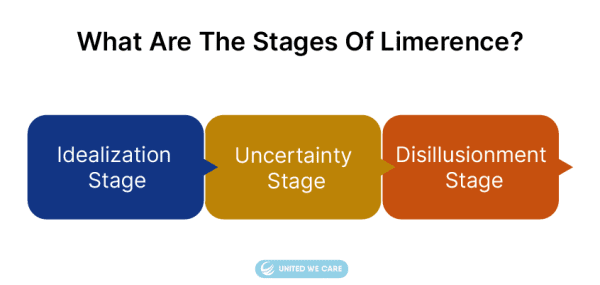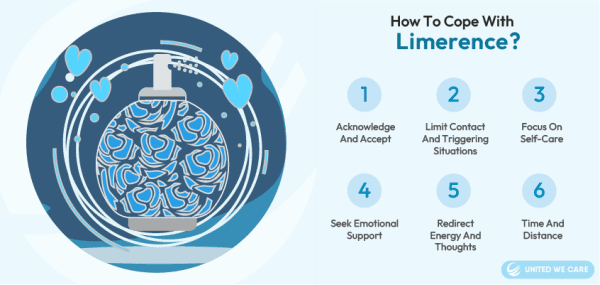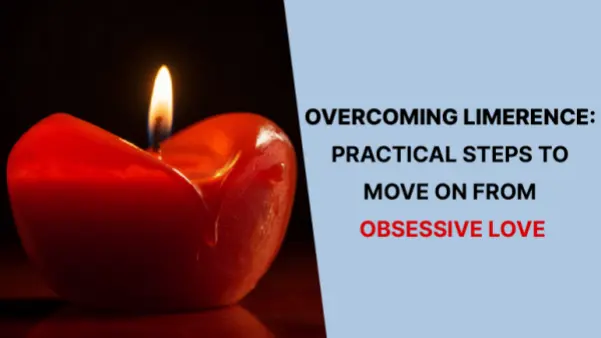Introduction
Have you ever come across a person who longs to be with someone romantically, even if they don’t feel the same way? Sounds like a movie plot, doesn’t it? But, it might come to your surprise there is an actual psychological reason and truth behind such movies. This psychological reason is called ‘Limerence.’ In this article, let’s find out what it actually means and how you can cope with the feelings of limerence.
“Limerence isn’t so much about commitment and intimacy as it is about obsession.”– Shahida Arabi [1]
What Is Limerence?
If you’ve seen the show FRIENDS, then you might have seen the one where Joey has a stalker named Erika Ford. She felt that she was head over heels in love with Joey’s character Dr. Drake Ramoray. Erika came after him and reached his house and tried to be with him, even though he did not have the same feelings. In fact, she wanted a different character altogether. But this is one example of how limerence can look like. Another would be the Hollywood movie “Fear,” where David goes to the extent of attempting to kill Nicole’s father, Steven.
Limerence is a term given by Psychologist Dorothy Tennov. It is an intense state of infatuation where you have troubling thoughts and fantasies about being with a person. If you are in limerence, then it’s possible that you want the person you are infatuated with to accept the feelings and return the same. When they don’t, you might react emotionally and physically. This can adversely affect your well-being [2].
What Are The Stages Of Limerence?
Psychologist Dorothy Tennov described three distinct stages of limerence based on her research on romantic love [3]:

- Idealization Stage: During the idealization stage, you might experience strong fascination and idealize the person you have affection for. You might feel that this person is absolutely perfect and flawless. You put them on a pedestal where they only have positive qualities and nothing else. They focus on the person’s positive qualities while disregarding flaws or negative aspects. While you are in this stage, you might feel overexcited and joyful and have a fierce need to be close to this person.
- Uncertainty Stage: During this stage, you are doubtful and anxious about whether your feelings will be reciprocated also or not. You might feel jittery and repetitively ask your loved one if they surely love you. In this stage, because you are doubtful, you might start obsessing over their every move and every reaction.
- Disillusionment Stage: In this stage, you stop idealizing your loved one. The pedestal and the heightened emotions start going down. You start seeing them as a more normal person. Here, either your obsession can end, or you might just fall genuinely and truthfully in love with them.
What Are The Characteristics Of Limerence?
As you got to know about the stages, I’m sure you understood some characteristics. Let me still tell you about it [4]:
- Intrusive Thoughts: You might face constant and involuntary thoughts about the person you intensely like. For example, how Erika thought of Dr. Drake all the time in FRIENDS.
- Idealization: You might see the person you are infatuated with as absolutely perfect and flawless as if they only had positive qualities. For example, remember how Erika started to lick Dr. Drake’s hands, thinking that he and his hands were perfect.
- Intense Emotions: You get overexcited and joyfully being in the presence or thinking of being in the presence of your loved one. And if your feelings are not returned, you might feel rejected and hopeless. For example, the time that Erika felt she was being cheated on by Dr. Drake, Joey had to tell her the truth, and she was shocked. Thankfully, all the other friends were there to help Joey out of this issue.
- Obsessive Preoccupation: You might have constant thoughts where you keep repeating situations that happened with your loved one, thinking about how it could have gone better or what you should say and do next. These thoughts can keep you away from fulfilling your personal and professional responsibilities.
- A Desire for Reciprocation: You might strongly want your loved one to feel the same way you do. If they do, it would act as a reassurance of choosing the right person to love, and it would be like your obsession and constant thoughts are okay and valid.
How To Cope With Limerence?
Since limerence can increase feelings of stress, anxiety, and even depression, it is important to be able to cope with it. It might be challenging, but it’s possible [5]:

- Acknowledge and Accept: The first step toward coping with limerence is to understand and accept that you are experiencing limerence. You need to realize that these feelings are just temporary.
- Limit Contact and Triggering Situations: You might have heard of the statement “Out of sight, out of mind.” So, you need to limit contact with your loved one. That way, you might be able to reduce the constant thoughts and heightened emotions. The more they are out of sight and contact, the more quickly you might be able to get them out of your mind and stop the obsession.
- Focus on Self-Care: Please remember you need to love yourself and indulge in self-care. Doing so can help you build your sense of self-worth and improve your overall health. You get get into an exercise routine along with breath control, meditation, and relaxation.
- Seek Emotional Support: Keep in mind that you are not the only one who is going through love and limerence-related issues. There are other people out there. Connecting with such people through support groups can be life-changing, specifically if you can see examples in front of you of people who have seen changes in their lives.
- Redirect Energy and Thoughts: Whenever your thoughts and feelings start to overpower you, you can channelize this energy into something more productive and positive activities. You can pick up a hobby, set personal goals, or even find creative ways to release this energy. Do whatever works best for you.
- Time and Distance: You need to remind yourself every now and then that the feelings of limerence can fade away over time. You just have to be patient with yourself and give yourself the space and healing for the emotions to start going down and then vanishing over time slowly. Don’t worry, you got this.
Conclusion
For people who have not experienced real and true love, it can be difficult to differentiate between love and limerence. Limerence being a strong infatuation with obsessive thoughts and heightened emotional state, is not really love. It can turn into love, as discussed in its third stage. But till then, you need to take care of yourself and keep your distance from your loved one.
If you want to know whether it is real love or limerence, contact our expert relationship counselors or explore more content at United We Care! At United We Care, a team of wellness and mental health experts will guide you with the best methods for well-being.
References
[1] S. Arabi, “Love Or Limerence? 11 Signs You’re In A Fantasy Relationship,” Love Or Limerence? 11 Signs You’re In A Fantasy Relationship | Thought Catalog, May 14, 2018. https://thoughtcatalog.com/shahida-arabi/2018/05/love-or-limerence-11-signs-youre-in-a-fantasy-relationship/
[2] D. Tennov, Love and Limerence: The Experience of Being in Love. Scarborough House, 1999. doi: 10.1604/9780812862867.
[3] R. A. Ackerman and D. T. Kenrick, “Cooperative courtship: Helping, waiting, and anticipating,” in Why Humans Have Sex, Oxford University Press, pp. 166–183.
[4] Aron, A., Fisher, H., and Strong, G., “Attachment in adulthood: Structure, dynamics, and change,” in Romantic love, Guilford Press, 2006, pp. 265–299.
[5] Weber, A. L. and Cupach, W. R., “Losing, leaving, and letting go: Coping with nonmarital breakups,” in The dark side of close relationships, 1998, pp. 267–306.





